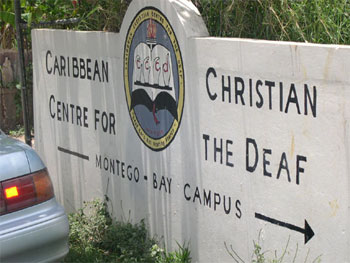GOSHEN, Ind. — A Franconia Conference native is participating in Goshen College’s Study-Service Term (SST) in Jamaica, with 14 other students during the summer semester. This is the first group that has American Sign Language (ASL) as its primary language into which students will be immersed.
Cody Felton, son of Jonathan and Rebecca Felton of Quakertown, is majoring in business. He is as 2005 graduate of Christopher Dock Mennonite High School and attends Perkasie Mennonite Church. He left for Jamaica on May 2 and will return to the United States on July 31. Assistant Professor of American Sign Language Sheila Yoder and Associate Professor of Communication Pat McFarlane are the group leaders.
To participate in this unit, students had to study ASL for at least two semesters. The unit is based in the capital of Kingston. All students will work in deaf schools throughout the country as the service component of the study abroad program, though this will occur during the first part of their semester abroad rather than in the last half as with most SST units.
After living at the school for six weeks, the students will return to Kingston to live with host families, engage in deeper study of ASL and learn about Jamaican Deaf culture. The Jamaica Association for the Deaf will assist with the education component of the program when the students are back in Kingston.
Director of International Education Tom Meyers believes that this is the first full semester academic ASL study abroad program in the country. He is not aware of any other colleges with such an offering which incorporates both study and service abroad, though some schools do offer several week mission trips with ASL as the primary language.
 “We have a tradition of offering SST programs in all the languages we teach here. We now offer ASL, so it is a natural extension of that philosophy,” Meyers said. “Our students will learn about Jamaican culture, but also Jamaican Deaf culture.”
“We have a tradition of offering SST programs in all the languages we teach here. We now offer ASL, so it is a natural extension of that philosophy,” Meyers said. “Our students will learn about Jamaican culture, but also Jamaican Deaf culture.”
Jamaica is a Caribbean island with a rich culture of music, art and cuisine, influenced by its history and blend of ethnic traditions. Jamaica also hosted Goshen College SST units in the 1970s. Jamaica has Third World realities; despite the large tourist industry, most Jamaicans are fairly poor. The country has a 15.9 percent unemployment rate. In addition the country appears to have an unusually large population of Deaf people. According to the Jamaica Association for the Deaf, more than 300 children are diagnosed each year with a mild to moderate hearing loss. Although many developing countries have no schools for Deaf children to attend, Jamaica does have an infrastructure of Deaf schools. There are more than eight schools for the Deaf, most started by mission groups, in a country slightly smaller in size than Connecticut.
English is the primary spoken language in Jamaica, but the Deaf community signs with a Jamaican Sign Language which is different from, but is heavily influenced by ASL. Jamaica was colonized first by the Spanish in the 1400s, later by the British and gained independence in 1962.
Web updates and photos from the group are available from Goshen College’s SST Web site at: www.goshen.edu/asl.
Since the first SST units went to Costa Rica, Jamaica and Guadeloupe in 1968 and began one of the country’s pioneer international education programs, nearly 7,000 students and 230 faculty leaders have traveled to 20 countries; the college currently organizes SST units to study and serve in China, Dominican Republic, Germany, Cambodia, Ethiopia, Senegal, Perú, Jamaica and Nicaragua. The program’s uncommon combination of cultural education and service-
learning remains a core part of the general education program, and has earned citations for excellence from U.S.News & World Report, Peterson’s Study Abroad and Smart Parents Guide to College, the John Templeton Foundation and American Council on Education.
Editors: For more information about this release or to arrange an
interview, contact Goshen College News Bureau Director Jodi H.
Beyeler at (574) 535-7572 or jodihb@goshen.edu.
Photo taken from Goshen College
The opinions expressed in articles posted on Mosaic’s website are those of the author and may not reflect the official policy of Mosaic Conference. Mosaic is a large conference, crossing ethnicities, geographies, generations, theologies, and politics. Each person can only speak for themselves; no one can represent “the conference.” May God give us the grace to hear what the Spirit is speaking to us through people with whom we disagree and the humility and courage to love one another even when those disagreements can’t be bridged.
